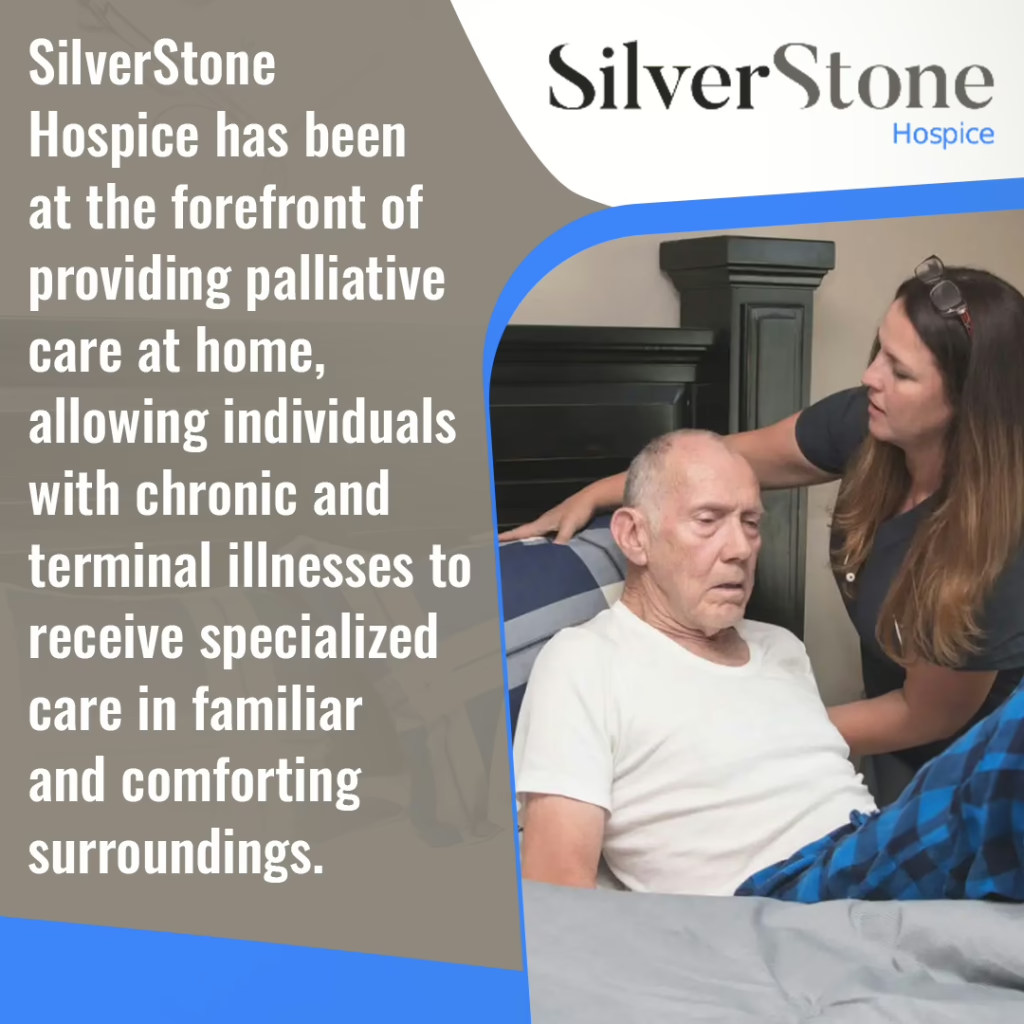
Synopsis
SilverStone Hospice offers compassionate palliative care focused on improving the quality of life for patients with serious illnesses, including cancer, heart disease, dementia, and more. The company provides personalized in-home care, ensuring comfort and relief from symptoms such as pain, nausea, and fatigue. Their expert team works closely with families, offering 24/7 support and guidance through complex healthcare decisions. By collaborating with insurance providers, SilverStone Hospice ensures that patients can access the care they need, regardless of financial barriers, offering services covered by Medicare, Medicaid, and private insurance.

Key Takeaways
- SilverStone Hospice specializes in in-home palliative care to improve the quality of life for patients with serious illnesses.
- The focus is on relieving symptoms like pain, nausea, fatigue, and breathlessness, ensuring comfort for patients and their families.
- Palliative care can be provided alongside curative treatments for those facing complex conditions.
- The company offers 24/7 care and support, addressing both physical and emotional needs.
- Insurance options, including Medicare, Medicaid, and private insurance, are available to ensure accessibility of care.
- Expert team members are dedicated to providing individualized care that aligns with patients’ preferences and lifestyles.
Palliative care is an essential component of comprehensive healthcare that focuses on improving the quality of life for individuals experiencing serious, life-limiting illnesses. At SilverStone Hospice, palliative care at home is a priority, providing tailored, compassionate care to ease discomfort and improve emotional well-being. Palliative care is a holistic approach to improving the quality of life for individuals dealing with serious health conditions, regardless of their prognosis. Unlike hospice care, which is specifically for patients in the final stages of life, palliative care can be provided alongside curative treatments and at any stage of illness.
Effective palliative care techniques can alleviate pain and enhance comfort. Our expert care team provides insights into various treatments and approaches to ensure optimal patient outcomes. The focus will be on ensuring patients experience less discomfort and better overall health outcomes through personalized care plans.
What Is Palliative Care?
Palliative care is a type of medical care tailored to enhance the quality of life for individuals facing serious illnesses, including cancer, heart failure, lung conditions, or dementia. Unlike treatments aimed at curing diseases, palliative care focuses on alleviating distressing symptoms such as pain, fatigue, breathlessness, nausea, and emotional stress.
This compassionate approach prioritizes the comfort and well-being of patients and their families, ensuring they receive the physical, emotional, and spiritual support needed during challenging times. Whether delivered at home or in a care facility, the objective remains the same: improving daily living and offering meaningful relief from discomfort.
An important aspect of palliative care is its compatibility with ongoing curative treatments. It works alongside these treatments to manage symptoms effectively, making it a valuable option for those navigating complex medical conditions. Each care plan is personalized, respecting the patient’s unique preferences, lifestyle, and health goals, fostering a holistic approach to care.
Effective Pain Management Strategies in Palliative Care
Effective pain management is a cornerstone of palliative care. For individuals facing serious, life-limiting illnesses, controlling pain and improving overall comfort are essential to preserving quality of life. Whether a patient is receiving palliative care at home or in a hospice facility, the goal is the same: to alleviate suffering, minimize discomfort, and provide compassionate support. At SilverStone Hospice, we understand the significant impact that pain can have on individuals and their families, and we prioritize individualized care to ensure patients experience comfort during their challenging journey.
Various palliative care strategies help manage pain effectively. These strategies ensure that patients experience relief while maintaining their dignity.
The Role of Pain Management in Palliative Care
Pain is one of the most common and distressing symptoms experienced by individuals with chronic conditions like cancer, heart disease, or neurodegenerative disorders. In palliative care, pain management goes beyond just administering medication. It is a multifaceted approach that involves addressing both physical symptoms and emotional, psychological, and spiritual needs.
At SilverStone Hospice, our team of healthcare professionals works closely with patients and their families to design a personalized care plan. We use a combination of pain management techniques to help patients manage pain, improve function, and enhance their overall quality of life.
1. Medication Management
One of the most common and effective strategies for pain relief in palliative care is medication management. The goal is to tailor the medication regimen to the specific type and intensity of pain the patient is experiencing. Different types of medications are used depending on the severity of the pain and the individual’s overall health condition.
- Opioids: For moderate to severe pain, opioids such as morphine, fentanyl, and hydrocodone are often prescribed. These medications are potent pain relievers and work well for conditions that cause continuous, intense pain. However, opioids must be carefully managed to prevent side effects such as nausea, constipation, or the risk of dependency. In palliative care at home, medication administration can be adjusted and monitored by healthcare professionals to minimize risks while ensuring adequate pain relief.
- Non-opioid Analgesics: For patients experiencing mild to moderate pain, non-opioid medications such as acetaminophen or nonsteroidal anti-inflammatory drugs (NSAIDs) may be sufficient. These medications are often used for conditions like arthritis or muscular pain and can help manage discomfort without the side effects associated with stronger opioids.
- Adjuvant Medications: These are drugs used in combination with primary pain relievers to enhance pain relief. Medications such as antidepressants, anticonvulsants, and corticosteroids may be prescribed to help with pain related to nerve damage, muscle inflammation, or cancer-related pain.
2. Physical Therapy and Rehabilitation
In palliative care, physical therapy is an important part of pain management, particularly for patients who have lost mobility or function due to illness or treatment. A tailored physical therapy program can help relieve musculoskeletal pain, improve mobility, and enhance overall comfort.
Physical therapists work with patients to develop a customized plan that may include strengthening exercises, stretching routines, and mobility training. These exercises aim to reduce pain and prevent further complications, such as muscle atrophy or joint stiffness. In some cases, in-home palliative hospice care may include regular visits from physical therapists to help patients stay as comfortable as possible in the familiar setting of their own homes.
3. Psychological Support
Pain management in palliative care isn’t just about physical relief—it also involves addressing the emotional and psychological challenges associated with living with a serious illness. Patients may experience feelings of anxiety, depression, or helplessness, which can worsen the perception of pain. Therefore, providing emotional and psychological support is crucial to comprehensive pain management.
- Counseling: Professional counseling can help patients and their families process difficult emotions and develop coping mechanisms. For patients experiencing chronic pain, therapy sessions can assist in reframing negative thoughts and reducing stress that may exacerbate pain.
- Mental Health and Wellness: Our team provides support through counseling, therapy, and other wellness activities to nurture the mental and emotional well-being of patients and caregivers. These services aim to address psychological challenges, reduce stress, and enhance overall quality of life.
- Spiritual Care: For many patients, spirituality plays a significant role in coping with illness and pain. Hospice Care Dallas provides spiritual care tailored to the patient’s specific beliefs, offering comfort and peace as the patient navigates difficult moments.
4. Nutrition and Hydration
Proper nutrition and hydration are essential elements in pain management. For patients in palliative care at home, ensuring they are receiving the right nutrients can significantly reduce fatigue, improve strength, and enhance the body’s ability to cope with pain. Malnutrition can make the pain more difficult to manage, so our team works closely with patients to ensure they maintain a balanced diet.
- Hydration: Dehydration can lead to discomfort and increase pain perception. At SilverStone Hospice, we emphasize the importance of staying hydrated, particularly for patients who may struggle with eating or drinking due to their condition.
- Dietary Modifications: A registered dietitian may assess the patient’s nutritional needs and recommend appropriate dietary changes to ensure optimal health. Nutritional support can help manage symptoms, such as nausea or constipation, which often accompany chronic illness and pain.
5. Education and Communication
A key component of palliative care is effective communication between patients, families, and healthcare providers. Our team of healthcare professionals takes the time to educate patients and their families about the pain management options available to them. Open communication ensures that patients’ concerns are addressed and that they understand their treatment options.
At SilverStone Hospice, we work with families to ensure they are well-informed about the pain management strategies being used. By providing clear explanations and fostering an open dialogue, we empower families to make the best decisions for their loved ones and ensure that care is aligned with their wishes.
Benefits of Palliative Care for Pain Management
Palliative care plays a crucial role in improving the quality of life for individuals living with chronic or life-limiting illnesses. One of the primary benefits of this type of care is its focus on effective pain management. Whether provided in a specialized facility or through palliative care in-home services, these interventions are designed to address physical, emotional, and psychological discomfort comprehensively.
Personalized Pain Management Plans
A key benefit of palliative care is its individualized approach. Pain is a complex and subjective experience, and each patient’s needs are unique. At SilverStone Hospice, personalized care plans are developed to ensure that patients receive the most appropriate treatments for their specific conditions. This tailored care is especially valuable in palliative care at home, where the familiar environment allows for customized adjustments to treatment plans, leading to enhanced comfort and well-being.
Multidisciplinary Care Teams
Palliative care in home emphasizes a collaborative approach. Multidisciplinary teams, including doctors, nurses, counselors, and physical therapists, work together to address every aspect of a patient’s pain. This holistic strategy is particularly beneficial for those seeking in-home hospice care, as it ensures that physical pain is managed alongside emotional and spiritual needs.
Medication and Advanced Therapies
Effective pain management often involves a combination of medication and complementary therapies. Through Dallas hospice services, patients access a wide range of treatments, including advanced pain-relief medications and therapies such as massage and physical therapy. These interventions are designed not only to alleviate pain but also to improve overall function and quality of life.
Comfort in Familiar Surroundings
Receiving palliative care at home provides an added layer of comfort for many patients. Being surrounded by loved ones in a familiar setting can significantly reduce stress and anxiety, which often exacerbate pain. Families searching for hospice companies find in-home services to be compassionate and convenient solutions.
Enhanced Quality of Life
Prioritizing pain relief in palliative care enables patients to maintain independence, engage in meaningful activities, and spend quality time with loved ones. Whether provided through in-home hospice care, these services enhance the patient experience, ensuring dignity and peace throughout their journey.
How to Access Palliative Care Services
Finding the right palliative care in-home or hospice service is crucial for individuals facing serious illnesses. SilverStone Hospice offers comprehensive care tailored to meet the needs of patients and their families. Whether you require palliative care services in Dallas, Texas, or in-home hospice care in the locality, we provide personalized support designed to enhance comfort and quality of life.
Our compassionate team ensures seamless access to services, including consultations, medical evaluations, and personalized care plans. For those seeking palliative care at home, we bring expert medical care, emotional support, and symptom management directly to you. Our focus on convenience and holistic well-being makes palliative care accessible and supportive during challenging times.
Insurance Coverage for Palliative Care
Understanding the financial aspects of palliative care in Texas is vital. At SilverStone Hospice, we assist families in navigating insurance coverage to make care affordable. From Medicare and Medicaid to private insurance, our team works diligently to handle paperwork and maximize benefits. Whether you choose palliative care at home or a hospice facility, we ensure that financial concerns do not hinder access to compassionate care.

Reach Out to SilverStone Hospice Today
When you or your loved one needs compassionate, professional care during life’s most challenging times, SilverStone Hospice is here to help. Serving families in Dallas, TX, and surrounding areas, we specialize in providing personalized care that prioritizes comfort, dignity, and quality of life.
Whether you’re looking for in-home hospice care, palliative care service at Dallas, or guidance navigating your care options, our dedicated team is just a call away. We understand the emotional and practical complexities of serious illnesses and are committed to walking beside you every step of the way.
Contact us at (214) 954-7285 or email info@silverstonehealthcare.com to speak with a caring professional today. Let SilverStone Hospice provide the compassionate support you deserve. Call now and take the first step toward peace of mind for you and your loved ones.